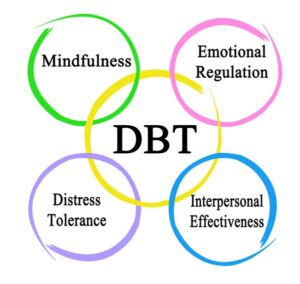If you are struggling with substance abuse, you may be wondering if DBT therapy can help. This type of therapy has been shown to be effective in helping people overcome a variety of issues, including addiction. In this blog post, we will discuss the benefits of DBT therapy and the things you need to know before seeking treatment.
Contents
What Is DBT Therapy?
 DBT therapy, or Dialectical Behavioral Therapy, is a type of cognitive behavioral therapy that helps individuals learn to manage their intense emotions and chaotic behavior. DBT is based on the idea that both acceptance and change are necessary for an individual to make lasting changes in their lives.
DBT therapy, or Dialectical Behavioral Therapy, is a type of cognitive behavioral therapy that helps individuals learn to manage their intense emotions and chaotic behavior. DBT is based on the idea that both acceptance and change are necessary for an individual to make lasting changes in their lives.
It emphasizes accepting yourself where you’re at while still striving to make positive changes in your life. DBT therapy focuses primarily on developing skills to manage emotions and reactions. While also helping individuals learn effective communication and problem-solving strategies.
Much research has been shown to be effective in helping individuals reduce depression, anxiety, or other mental health challenges. It also teaches skills that can be used to improve relationships and overall quality of life. So, be sure to discuss DBT therapy with your doctor if you think it may be beneficial for you.
Can DBT Be Used For Substance Abuse?
Yes, Dialectical Behavior Therapy (DBT) can be used to help individuals struggling with substance abuse. DBT focuses on altering behavior and emotion regulation skills that are critical to recovery from addiction. It is an evidence-based approach that helps individuals identify healthy ways of coping with their triggers and emotions associated with using substances.
As substance abuse is often a way to cope with unpleasant emotions or situations. And, DBT helps patients better identify, manage and express their thoughts and feelings in a healthy manner. It also teaches individuals how to create life balance by identifying core values, managing time effectively, setting boundaries, and developing meaningful relationships.
So, there are high chances of a successful recovery from substance addiction when DBT is used. It helps individuals become aware of their triggers and replace unhealthy coping strategies with healthier alternatives. Ultimately, DBT can help an individual develop the skills necessary to live a substance-free life.
What Are The Common Techniques Used In DBT?
When opting for DBT therapy for substance abuse, you must be aware of the following techniques:
1. Mindfulness: This technique helps individuals to be aware of their thoughts and feelings without judgment or evaluation, only acceptance. It allows them to view life as it is rather than thinking how it should be.
2. Distress Tolerance: It teaches individuals how to accept, tolerate, and manage intense emotions without acting on them. Also helps individuals to withstand difficult situations in life without making any drastic decisions that they may later regret.
3. Interpersonal effectiveness: This technique teaches individuals how to communicate effectively with family members, friends, and other people in their lives. It also helps them set boundaries and maintain self-respect while being assertive at the same time.
4. Emotion Regulation: This technique teaches individuals how to regulate their emotions, rather than being controlled by them. It also helps them change negative thoughts and behaviors that lead to destructive patterns.
5. Walking the Middle Path: This technique encourages individuals to find a balance between acceptance and change. It focuses on finding meaningful solutions and encourages individuals to be compassionate and kind to themselves.
All in all, these are just a few common techniques used in Dialectical Behavior Therapy. Depending on the individual and their situation, a therapist may also use other techniques such as:
- Cognitive Behavioral Therapy (CBT)
- Exposure and Response Prevention (ERP)
- Motivational Interviewing
With the right guidance and support, people can learn these skills and use them to overcome their substance use disorder. DBT is a powerful tool that can be used to help people lead happier, healthier lives.
What Are The Benefits Of DBT Therapy For Substance Abuse?
 Well, if you are opting for DBT therapy for substance abuse, here are some of its core benefits:
Well, if you are opting for DBT therapy for substance abuse, here are some of its core benefits:
1. Decreased drug and alcohol cravings – One of the most important benefits of DBT is the decrease in cravings for drugs and alcohol. With effective use of skills, a person can learn to better manage their own emotional reactions, thereby reducing the urge to use substances as an emotional coping mechanism.
2. Improved self-worth – It helps individuals become more aware of themselves, developing self-acceptance and understanding in the process. This results in improved self-esteem, which further helps in avoiding negative behaviors like substance abuse.
3. Enhanced quality of life – Many people have reported positive changes in their day-to-day life after going through DBT. They feel better about themselves, have improved relationships with others, and overall see an improved quality of life.
4. Improved communication skills – Through its focus on mindfulness, individuals learn how to be present at the moment and hone their communication skills. This helps them become better at expressing their thoughts and opinions, further helping them in avoiding substance abuse as it often masks emotions.
5. Reduced depression – DBT has been found to be effective in reducing symptoms of depression, which is a common co-occurring disorder associated with substance use disorders. This helps people become more resilient against relapse and lead healthier lifestyles.
By using DBT, individuals can overcome their substance abuse issues and lead healthier lives. With its focus on mindfulness, skills building, and distress tolerance, it is an effective approach to treating addiction.
Who Should Avoid DBT?
Though the effectiveness of DBT for substance abuse and mental health issues has been proven. But there are certain individuals who should not seek out this type of treatment. This is because this kind of therapy requires a high degree of commitment and participation. Without these things, the individual will likely not benefit from DBT.
Following are some examples of individuals who should not use DBT:
- People who are not willing to commit to completing their homework assignments, attending therapy sessions, and making lifestyle changes needed for recovery.
- Individuals suffering from severe mental illness or psychosis. As DBT is primarily used as a treatment for personality disorders and related issues, it may not be effective for those with severe mental health issues.
- People who only want to focus on their positive traits and not acknowledge any negative behaviors or emotions. DBT requires people to accept that they have shortcomings and work towards making changes in this regard, which may be challenging for some individuals.
- Individuals who are not comfortable with the idea of having a therapist guide their recovery. As DBT requires individuals to be open and honest with their therapy, this may not be suitable for those who are uncomfortable talking about their emotions.
- People who are unwilling to ask for help or accept assistance from professionals. DBT works best when individuals actively seek out support from therapists and other members of their support network.
Ultimately, individuals who do not feel comfortable with the idea of DBT should seek out alternative treatment options. Or talk to their primary care doctor about what other treatments may be available. Different types of therapy may be more suitable for some people depending on their mental health needs and preferences.
Can I Self-Manage My Substance Abuse?
 People with substance use disorder may be able to self-manage their condition through certain lifestyle and behavior changes. These include:
People with substance use disorder may be able to self-manage their condition through certain lifestyle and behavior changes. These include:
- Avoiding triggers and high-risk situations that may lead to using substances.
- Developing and following a plan to stay sober, such as setting goals, attending support groups or counseling sessions, and engaging in healthy activities.
- Making lifestyle changes such as exercising regularly, eating nutritious foods, getting sufficient sleep, and reducing stress.
- Staying connected to a sober support network of family, friends, and professionals that can help during difficult times.
Self-management is not easy, but it can be effective when combined with professional treatment. A person’s recovery plan should include regular check-ins with a healthcare provider or addiction specialist to ensure they are on the road to recovery.
The most important thing is that people struggling with substance use disorder seek help. Professional treatment and self-management strategies can work together to help someone achieve sobriety. With the right support, anyone can get back on track and live a happy and healthy life.
Conclusion
In a nutshell, DBT therapy for substance abuse is thought to be an effective form of treatment for individuals with substance use disorder. It combines CBT and mindfulness techniques to help people find better ways of managing their cravings. And identifying triggers that lead to substance abuse. Also, it helps them develop healthier coping mechanisms.
While it may not be the right fit for everyone, it has been found to be very effective in helping individuals build better lives and maintain recovery. Ultimately, DBT therapy is an invaluable tool for both individuals seeking to make changes and mental health professionals working to help them do so.
For more information, please contact MantraCare. Abuse is a serious and harmful behavior that can cause physical, emotional, or psychological harm to a person. If you have any queries regarding Online Counseling experienced therapists at MantraCare can help: Book a trial Online therapy session


